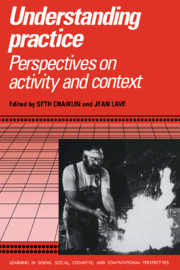1 - The practice of learning
Published online by Cambridge University Press: 06 January 2010
Summary
The problem with “context”
This book grew out of the work of a two-part conference in which the participants came together to consider what we initially called “the context problem.” All of us were involved in research on socially situated activity. We were concerned about conventional limitations on various approaches to the study of activity. In particular, we wished to explore questions about the “socially constituted world” – the context of socially situated activity – that our work often seemed merely to take for granted.
I had tried in previous research to understand how math activity in grocery stores involved being “in” the “store,” walking up and down “aisles,” looking at “shelves” full of cans, bottles, packages and jars of food, and other commodities. My analyses were about shoppers' activities, sometimes together, and about the relations between these activities and the distractingly material, historically constituted, subjectively selective character of space-time relations and their meaning. Both Seth Chaiklin and I knew that other people conceived of the problem in quite different terms. We decided to hold a collective inquiry into these old, but still perplexing questions (e.g., Bartlett, 1958; Goffman, 1964; Barker, 1963, 1968; Birdwhistell, 1970; and more recently Dannefer, 1991; Haraway, 1988; Rommetveit, 1987, 1988; Hanks, 1990a, 1990b; Goodwin & Duranti, 1992). The time seemed appropriate for such a project, given that theoretical approaches to the study of situated activity, and hence to its situations, had fairly recently become surprisingly diverse and increasingly informed by rich empirical research. The traditions behind the work in this book include activity theory, critical psychology, Barker's ecological psychology, cognitive anthropology, and ethnomethodological perspectives.
- Type
- Chapter
- Information
- Understanding PracticePerspectives on Activity and Context, pp. 3 - 32Publisher: Cambridge University PressPrint publication year: 1993
- 496
- Cited by



